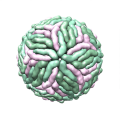DE FAAKTO OUTBREAK INTELLIGENCE
08 FEBRUARY 2019
OUTBREAK OBSERVATIONS
ZIKA VIRUS IN THE AMERICAS
ZIKA VIRUS IN THE AMERICAS OBSERVATIONS & STATS COLLATED FROM The International Society for Infectious Diseases
Mexico
- 28 reported Zika cases in 2018 (Yucatan Times)
Dominican Republic
- 2016-2017
- 1282 pregnant women with suspected Zika virus infection
- Fetal loss was reported for approximately 10 percent of the reported pregnancies
- 3 cases of fetal microcephaly were reported
- Women infected during the 1st trimester were more likely to have early fetal loss (CDC)
Bolivia
- 30 December 2018
- 58 suspected Zika cases
- 25 confirmed Zika cases (Los Tiempos)
Brazil
- 28 December 2018
- 1051 registered Zika cases (Globo.com)
USA
Pregnant Women with Any Laboratory Evidence of Possible Zika Virus Infection-2015-2018 (CDC)
US States & the District of Columbia
- 2,490 possible Zika Virus Infection (CDC)
US Territories & Freely Associated States
- 4,917 possible Zika Virus Infection (CDC)
Imported cases with little or no possibility of ongoing mosquito transmission
- Laboratory-confirmed symptomatic Zika virus disease cases and presumptive viremic blood donors reported to ArboNET by states and territories– mainland United States, 2018 (CDC)
State / Symptomatic cases / Viremic blood donors
(Viremic blood donors: People who reported no symptoms at the time of donating blood, but whose blood tested positive when screened for the presence of Zika virus)
- Alabama 2 / 6
- Arizona 1 / 0
- California 23 / 0
- Florida 12 / 2
- Illinois 3 / 0
- Maryland 1 / 0
- Massachusetts 1 / 0
- Minnesota 1 / 1
- Mississippi 0 / 1
- New Jersey 4 / 0
- New York 6 / 0
- North Carolina 4 / 0
- Oregon 1 / 0
- Texas 3 / 0
- Utah 1 / 0
- Virginia 1 / 0
- Totals 64 / 10 (CDC)
Territories and Commonwealth with local transmission
Symptomatic / Blood donors
- American Samoa 0 / 0
- Puerto Rico 114 / 0
- US Virgin Islands 2 / 0
- Total 116 / 0 (CDC)
About Zika
Zika virus spreads to people primarily through the bite of an infected Aedes
species mosquito (Ae. aegypti and Ae. albopictus). The mosquitoes that spread
Zika can bite at day and night.
Zika virus can also spread
• During sex with a person who has Zika to his or her sex partners.
• From a pregnant woman to her fetus during pregnancy
or around the time of birth.
• Through blood transfusion (likely but not confirmed). (CDC, 2018)
Zika Symptoms
Many people infected with Zika won’t have symptoms or
will only have mild symptoms. The most common symptoms are fever, rash,
headache, joint pain, red eyes, and muscle pain. Symptoms can
last for several days to a week. People usually don’t get sick enough to go to the
hospital, and they very rarely die of Zika. Once a person has been infected with
Zika, they are likely to be protected from future infections. (CDC, 2018)
Why Zika is Risky for Some People
Zika infection during pregnancy can cause microcephaly and other birth defects.
Microcephaly is a birth defect in which a baby’s head is smaller than expected when
compared to babies of the same sex and age. There have also been increased reports
of Guillain-Barré syndrome, an uncommon sickness of the nervous system, in areas
affected by Zika. (CDC, 2018)
How to Prevent Zika
There is no vaccine to prevent Zika. The best way to prevent diseases spread by
mosquitoes is to protect yourself and your family from mosquito bites and from
getting Zika through sex (CDC, 2018)
What to Do if You Have Zika
There is no specific medicine to treat Zika. Treat the symptoms:
• Get plenty of rest.
• Drink fluids to prevent dehydration.
• Take medicine such as acetaminophen to reduce fever and pain.
• Do not take aspirin or other non-steroidal anti-inflammatory drugs.
• If you are taking medicine for another medical condition, talk to
your healthcare provider before taking additional medication.
To help prevent others from getting sick, strictly follow steps to
prevent mosquito bites during the first week of illness. (CDC, 2018)
Yucatan Times https://www.theyucatantimes.com/2019/01/chikungunya-making-a-comeback-in-yucatan-while-dengue-and-zika-decrease/
CDC https://wwwnc.cdc.gov/eid/article/25/2/18-1054_article
CDC https://www.cdc.gov/zika/reporting/2018-case-counts.html
CDC https://www.cdc.gov/pregnancy/zika/data/pregwomen-uscases.html
ProMED-mail http://www.promedmail.org/
International Society for Infectious Diseases http://www.isid.org/
CDC Zika https://www.cdc.gov/zika/index.html






